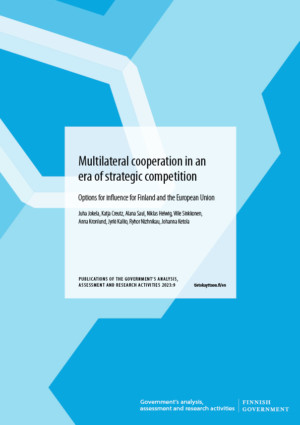This report shows that ongoing transformations in multilateral cooperation and intensifying global challenges are making multilateralism vulnerable to strategic competition when it comes to its conduct, fundamental norms, and in respect of its aims. The report contends that while formal multilateral institutions are not forsaken in principle, alternative forums are often prioritised in practice. Different powers utilise both the UN system, as well as alternative institutions, broad and more narrow-based informal institutions such as the G Groups, and ad hoc formations. Regional multilateralism is gaining ground as an attractive alternative form of cooperation.
These observations have been made by examining key powers’ takes on multilateral coop-eration: the European Union, the United States, China, and Russia, and the role of multilateral cooperation in managing the Covid-19 pandemic.
The EU is Finland’s most important reference group and its key channel for exerting influence. Making the EU a stronger and more unitary actor in multilateral cooperation is clearly in Finland’s interests. Increased political attention and expertise directed towards flexible and informal forms of multilateral cooperation, and key actors in the Global South, would enhance smaller states’ aspirations to remain relevant players in multilateral cooperation in an era of strategic cooperation.
This publication is part of the implementation of the Government Plan for Analysis, Assessment and Research. (tietokayttoon.fi) The content is the responsibility of the producers of the information and does not necessarily represent the view of the Government. The permanent address of the publication is: https://urn.fi/URN:ISBN:978-952-383-400-2.










